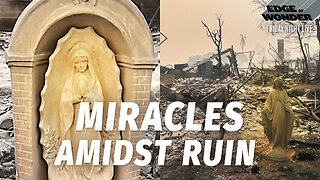Premium Only Content

Episode 1711: St Athanasius I
St. Anastasius I, also known as Pope Anastasius I, served as the Bishop of Rome and the Pope from November 27, 399, until his death on December 19, 401. Unfortunately, detailed historical information about his life is limited, and much of what is known comes from historical records and writings of the time.
Anastasius I became pope during a period when the Church was grappling with theological controversies, particularly the Pelagian heresy. Pelagianism, associated with the monk Pelagius, denied the concept of original sin and emphasized the role of human free will in attaining salvation. Pope Anastasius I was involved in the theological discussions and confrontations related to Pelagianism during his pontificate.
Apart from his involvement in theological matters, not much else is recorded about Anastasius I's activities or contributions during his papacy. His papacy is generally considered to have been relatively uneventful compared to some of his predecessors and successors.
St. Anastasius I's involvement in theological matters, particularly his response to the Pelagian controversy, marked a significant aspect of his papacy. Pelagianism, a theological heresy associated with the monk Pelagius, challenged the prevailing Christian understanding of original sin and the role of divine grace in salvation.
Pelagius argued that human beings had the ability to live sinlessly and attain salvation through their own efforts, without the need for divine grace. He rejected the notion of original sin inherited from Adam and believed that individuals could choose to live virtuously through their own free will. This view posed a challenge to traditional Christian teachings on the fallen nature of humanity and the necessity of God's grace for salvation.
In response to the spread of Pelagianism, Pope Anastasius I took a firm stance against this heresy. He supported the condemnation of Pelagian teachings and reaffirmed the importance of divine grace in the process of salvation. Pope Anastasius I worked to defend and uphold orthodox Christian doctrine, emphasizing the need for divine assistance in overcoming the effects of original sin.
The Pope's efforts were part of a broader theological struggle within the Christian Church during the late 4th and early 5th centuries. The Pelagian controversy involved various ecclesiastical figures, including Augustine of Hippo, who played a crucial role in articulating the orthodox position on grace and original sin. Ultimately, the Council of Carthage in 418, held after Anastasius I's pontificate, formally condemned Pelagianism and affirmed the importance of divine grace in the process of salvation.
While specific details of Pope Anastasius I's theological writings or discourses are not extensively documented, his role in opposing Pelagianism and promoting orthodox Christian beliefs contributed to the resolution of a significant theological challenge during his time as Pope.
St. Anastasius I is venerated as a saint in the Catholic Church, and his feast day is commemorated on December 19. While the historical details about his life are limited, his role in addressing theological controversies of his time contributes to his significance in the history of the early Christian Church.
-
 1:32:34
1:32:34
Glenn Greenwald
2 hours agoThe Future of Gaza With Abubaker Abed; Journalist Sam Husseini On His Physical Expulsion From Blinken’s Briefing & Biden’s Gaza Legacy | System Update #391
20.7K27 -
 LIVE
LIVE
Roseanne Barr
5 hours ago $2.83 earnedWe are so F*cking Punk Rock! with Drea de Matteo | The Roseanne Barr Podcast #83
2,396 watching -
 LIVE
LIVE
Joker Effect
15 minutes agoUkraine in a video game? Hardest thing I have done. S.T.A.L.K.E.R.2 Heart of Chornobyl,
350 watching -
 51:58
51:58
PMG
4 hours ago"Can the Government Learn from Elon Musk’s 70% Labor Cut? A Deep Dive into Inefficient Agencies"
158 -
 LIVE
LIVE
Amish Zaku
3 hours agoRumble Spartans #10 - New Year New Maps
98 watching -
 1:04:58
1:04:58
In The Litter Box w/ Jewels & Catturd
1 day agoNo Tax On Tips! | In the Litter Box w/ Jewels & Catturd – Ep. 722 – 1/17/2025
119K31 -
 5:35:39
5:35:39
Dr Disrespect
10 hours ago🔴LIVE - DR DISRESPECT - WARZONE - CRAZY CHALLENGES
147K31 -
 1:16:30
1:16:30
Edge of Wonder
5 hours agoLA Fire Updates: Miracles Amidst the Devastation
10K5 -
 54:54
54:54
LFA TV
9 hours agoBanning Mystery of the Ages | TRUMPET DAILY 1.17.25 7pm
13.8K3 -
 1:47:13
1:47:13
2 MIKES LIVE
3 hours ago2 MIKES LIVE #168 Open Mike Friday!
14.2K2